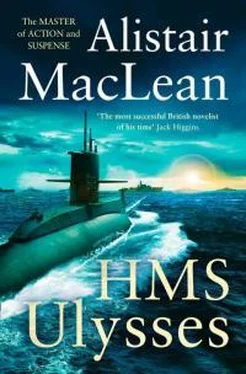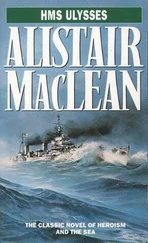‘But I never meant–’
‘I know. It does not matter . . . it is better this way.’ It was almost impossible to make out what he was saying. ‘Tell Captain Vallery that Petersen says he is very sorry . . . I tried to tell the Captain yesterday.’
‘Sorry! Sorry for what?’ Madly Carrington flung all his strength against the iron bar: the hatchcover did not even quiver.
‘The dead marine in Scapa Flow . . . I did not mean to kill him, I could never kill any man . . . But he angered me,’ the big Norwegian said simply. ‘He killed my friend.’
For a second, Carrington stopped straining at the bar. Petersen! Of course – who but Petersen could have snapped a man’s neck like that. Petersen, the big, laughing Scandinavian, who had so suddenly changed overnight into a grave unsmiling giant, who stalked the deck, the mess-decks and alleyways by day and by night, who was never seen to smile or sleep. With a sudden flash of insight, Carrington saw clear through into the tortured mind of that kind and simple man.
‘Listen, Petersen,’ he begged. ‘I don’t give a damn about that. Nobody shall ever know, I promise you. Please Petersen, just–’
‘It is better this way.’ The muffled voice was strangely content. ‘It is not good to kill a man . . . it is not good to go on living . . . I know . . . Please, it is important – you will tell my Captain – Petersen is sorry and filled with shame . . . I do this for my Captain.’ Without warning, the crowbar was plucked from Carrington’s hand. The cover clanged down in position. For a minute the wheelhouse flat rang to a succession of muffled, metallic blows. Suddenly the clamour ceased and there was only the rippling surge of the water outside the wheelhouse and the creak of the wheel inside as the Ulysses steadied on course.
The clear sweet voice soared high and true above the subdued roar of the engine-room fans, above the whine of a hundred electric motors and the sound of the rushing of the waters. Not even the metallic impersonality of the loudspeakers could detract from the beauty of that singing voice . . . It was a favourite device of Vallery’s when the need for silence was not paramount, to pass the long, dark hours by coupling up the record-player to the broadcast system.
Almost invariably, the musical repertoire was strictly classical – or what is more often referred to, foolishly and disparagingly, as the popular classics. Bach, Beethoven, Tchaikovski, Lehar, Verdi, Delius – these were the favourites. ‘No. 1 in B flat minor’, ‘Air on a G string’, ‘Moonlight on the Alster’, ‘Claire de Lune’, ‘The Skater’s Waltz’ – the crew of the Ulysses could never have enough of these. ‘Ridiculous’, ‘impossible’ – it is all too easy to imagine the comments of those who equate the matelot’s taste in music with the popular conception of his ethics and morals; but those same people have never heard the hushed, cathedral silence in the crowded hangar of a great aircraft carrier in Scapa Flow as Yehudi Menuhin’s magic bow sang across the strings of the violin, swept a thousand men away from the harsh urgencies of reality, from the bitter memories of the last patrol or convoy, into the golden land of music.
But now a girl was singing. It was Deanna Durbin, and she was singing ‘Beneath the Lights of Home’, that most heartbreakingly nostalgic of all songs. Below decks and above, bent over the great engines or huddled by their guns, men listened to the lovely voice as it drifted through the darkened ship and the falling snow, and turned their minds inwards and thought of home, thought of the bitter contrast and the morning that would not come. Suddenly, halfway through, the song stopped.
‘Do you hear there?’ the speakers boomed. ‘Do you hear there? This – this is the Commander speaking.’ The voice was deep and grave and hesitant: it caught and held the attention of every man in the ship.
‘I have bad news for you.’ Turner spoke slowly, quietly. ‘I am sorry – I . . .’ He broke off, then went on more slowly still. ‘Captain Vallery died five minutes ago.’ For a moment the speaker was silent, then crackled again. ‘He died on the bridge, in his chair. He knew he was dying and I don’t think he suffered at all . . . He insisted – he insisted that I thank you for the way you all stood by him. “Tell em” – these were his words, as far as I remember – “tell em,” he said, “that I couldn’t have carried on without them, that they are the best crew that God ever gave a Captain.” Then he said – it was the last thing he said: “Give them my apologies. After all they’ve done for me – well, well, tell them I’m terribly sorry to let them down like this.” That was all he said – just “Tell them I’m sorry.” And then he died.’
Chapter Sixteen
SATURDAY NIGHT
Richard Vallery was dead. He died grieving, stricken at the thought that he was abandoning the crew of the Ulysses , leaving them behind, leaderless. But it was only for a short time, and he did not have to wait long. Before the dawn, hundreds more, men in the cruisers, the destroyers and the merchantmen, had died also. And they did not die as he had feared under the guns of the Tirpitz – another grim parallel with PQ17, for the Tirpitz had not left Alta Fjord. They died, primarily, because the weather had changed.
Richard Vallery was dead, and with his death a great change had come over the men of the Ulysses . When Vallery died, other things died also, for he took these things with him. He took with him the courage, the kindliness, the gentleness, the unshakable faith, the infinitely patient and understanding endurance, all these things which had been so peculiarly his own. And now these things were gone and the Ulysses was left without them and it did not matter. The men of the Ulysses no longer needed courage and all the adjuncts of courage, for they were no longer afraid. Vallery was dead and they did not know how much they respected and loved that gentle man until he was gone. But then they knew. They knew that something wonderful, something that had become an enduring part of their minds and memories, something infinitely fine and good, was gone and they would never know it again, and they were mad with grief. And, in war, a grief-stricken man is the most terrible enemy there is. Prudence, caution, fear, pain – for the grief-stricken man these no longer exist. He lives only to lash out blindly at the enemy, to destroy, if he can, the author of his grief. Rightly or wrongly, the Ulysses never thought to blame the Captain’s death on any but the enemy. There was only, for them, the sorrow and the blind hate. Zombies, Nicholls had called them once, and the Ulysses was more than ever a ship manned by living zombies, zombies who prowled restlessly, incessantly, across the snow and ice of the heaving decks, automatons living only for revenge.
The weather changed just before the end of the middle watch. The seas did not change – FR77 was still butting into the heavy, rolling swell from the north, still piling up fresh sheets of glistening ice on their labouring fo’c’sles. But the wind dropped, and almost at once the snowstorm blew itself out, the last banks of dark, heavy cloud drifting away to the south. By four o’clock the sky was completely clear.
There was no moon that night, but the stars were out, keen and sharp and frosty as the icy breeze that blew steadily out of the north.
Then, gradually, the sky began to change. At first there was only a barely perceptible lightening on the northern rim then, slowly, a pulsating flickering band of light began to broaden and deepen and climb steadily above the horizon, climbing higher to the south with the passing of every minute. Soon that pulsating ribbon of light was paralleled by others, streamers in the most delicate pastel shades of blue and green and violet, but always and predominantly white. And always, too, these lanes of multi-coloured light grew higher and stronger and brighter: at the climax, a great band of white stretched high above the convoy, extending from horizon to horizon . . . These were the Northern Lights, at any time a spectacle of beauty and wonder, and this night surpassing lovely: down below, in ships clearly illumined against the dark and rolling seas, the men of FR77 looked up and hated them.
Читать дальше
Конец ознакомительного отрывка
Купить книгу










